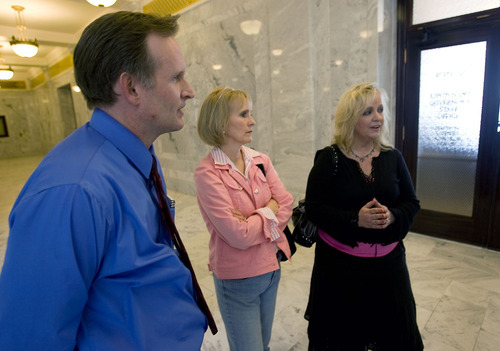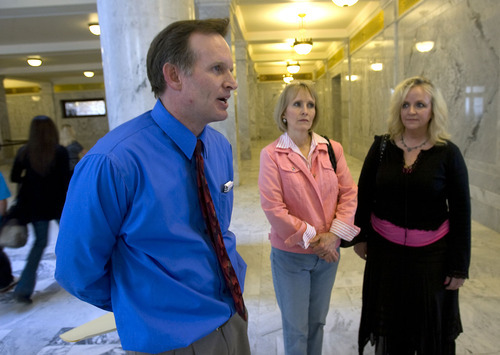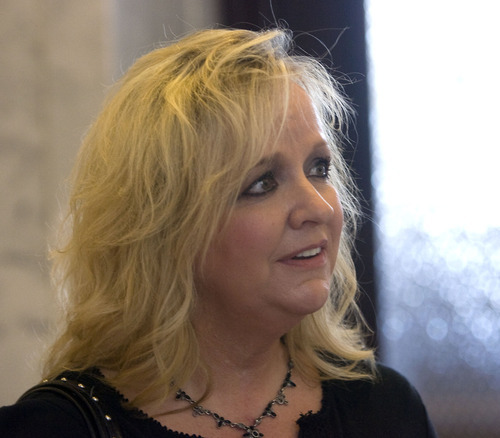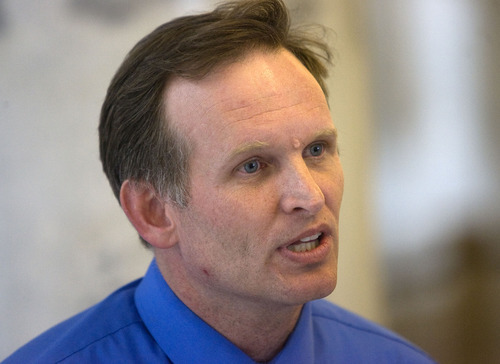This is an archived article that was published on sltrib.com in 2011, and information in the article may be outdated. It is provided only for personal research purposes and may not be reprinted.
A group of Utah citizens filed the first referendum petition Thursday seeking to repeal the law restricting public access to government records.
"We'll do whatever it takes to put a stop to HB477," said Steve Maxfield, who said the bill — hastily passed, then recalled and amended and signed by Gov. Gary Herbert — impedes a "sacred" right of the people to see what government is doing.
Maxfield, Republican National Committeewoman Nancy Lord and GOP activist Janalee Tobias walked into the lieutenant governor's office at 10:40 a.m. to register the referendum.
Maxfield, who ran for lieutenant governor with independent gubernatorial candidate Farley Anderson, whose name was added to the ballot after the Utah Supreme Court ruled the electronic signatures he submitted were valid, also filed a voter initiative seeking to reverse SB165, a bill passed Wednesday banning e-signatures for ballot measures.
Maxfield and his group hope to be able to use electronic signatures for both efforts, but that could be complicated by the passage of SB165.
Herbert signed the bill at 1 p.m. on Thursday, a couple hours after Maxfield and company filed their referendum paperwork.
But Mark Thomas, administrator of the lieutenant governor's office, said it may not matter when the bill was signed. He said there are court rulings that, if a group hasn't started collecting signatures when the new law takes effect, the group gathering the signatures needs to comply with the newly enacted law.
"Where he's actually filing today," Thomas said, "he probably would have to go with the new law."
That law would require the group to gather about 97,000 signatures instead of the roughly 65,000 required under the old law.
Maxfield said they will start organizing supporters immediately. His group has registered two websites — stop477.org and stop477.com — and plans to begin gathering signatures as soon as the lieutenant governor makes the packets available.
Other groups also may be filing a referendum on HB477, he said, and he expects all of the opponents of the bill to work together.
"This is an affront against every registered voter," said Lord. "I think it's an issue the people of Utah need to say 'enough is enough.' "
As it is written, HB477 makes text messages, instant messages, video chat and other electronic communications secret, regardless of their content. It imposes new fees for researching and processing requests. And it strips a philosophical statement that government records are presumed to be public unless they are protected because they contain private information or for other reasons.
Herbert objected to the speed with which the bill was rushed through the Legislature — three days — and he negotiated an arrangement with legislative leaders to recall the bill and postpone its implementation until July 1 so discussions could be had and, if necessary, changes could be made.
But he angered some by announcing Tuesday night that he had signed the bill. In an interview on Wednesday, the governor explained that his veto could have been overridden by the Legislature — although the amended bill only got 42 votes, short of the 50 needed to override — and by signing the bill he sets the stage for debate on the issue.
"We've provided a mechanism now for us to get from where we are at to where we need to be," Herbert said.
A rally is scheduled for 6 p.m. Thursday at the Capitol to voice opposition to HB477.









